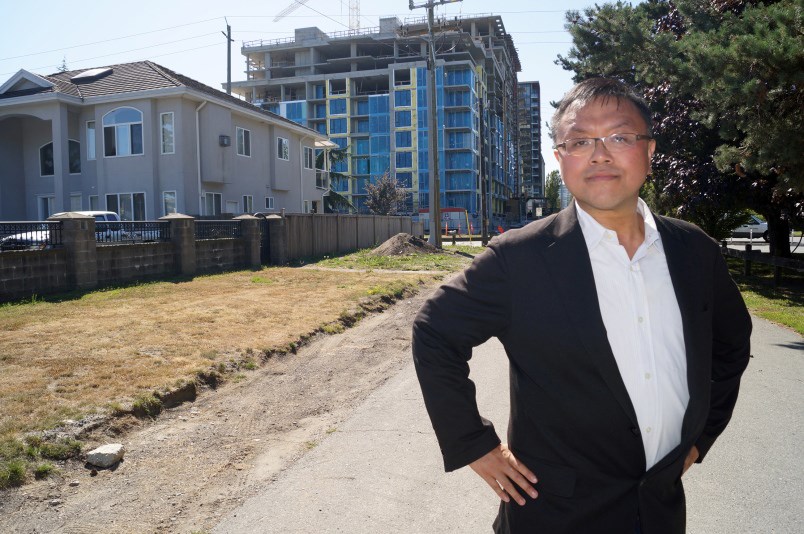There’s keeping up with the Joneses. But what happens when the Joneses can’t keep up? Such is the case, so to speak, for Dylan Jones’ young family.
The born-and-raised Richmond resident of 31 years is being evicted from his rented single-family home of five years on Aquila Road this September — forcing this young family of five to look beyond the city to find adequate housing within their means.
Meanwhile, Richmond city council is in the midst of revising its supply-oriented Affordable Housing Strategy, which hasn’t been thoroughly updated since 2007.
Over the course of the past 10 years, single-family home prices have shot up 140 per cent (67 per cent in three years), rental costs have soared and the stock of available, affordable and accessible housing has nearly vanished.
The long-term repercussions of high housing costs are starting to show, according to many Metro Vancouver affordable housing advocates, such as Gary Liu, of Housing Action for Local Taxpayers (HALT).
“We are already seeing the consequences: lack of services; talented people moving away; families capable of earning an income and choosing to move away,” said Liu.
As the federal government continues to mull over a national housing strategy, the Bank of Canada tweaks its historic, low interest rates and a new NDP provincial government intends on working with the federal government on real estate tax loopholes, the City of Richmond is prepared to start asking developers to chip in more by way of affordable housing.
Last week, council approved a revised strategy policy that now requires developers of any complex over 60 units to build 10 per cent of all units as low-end, rent-controlled (thresholds are set by the city, via BC Housing) for low-income residents. The previous requirement was five per cent affordable units in an 80-unit complex.
In 2007, the goal was to create 2,790 such units. To date, 336 have been created in Richmond.
Any complex under 60 units will require cash contributions, which have, on average, approximately doubled. In rezoned developments, a single-family home will now be charged $4 per square foot; a townhouse unit will pay $8.50; and wood/concrete apartment units will pay $10/14.
The estimated $1.5 million per year raised will go into a reserve account to build subsidized (non-market) housing projects in partnership with the provincial and federal governments and non-profit sector, said Joyce Rautenberg, Richmond’s affordable housing coordinator.
The Urban Development Institute, which advocates for developers, was a key stakeholder in policy consultation and opposed some of the measures, stating: “We are concerned that the additional requirements on the new housing market will slow down the supply of market housing, which will have a detrimental impact on affordability.”
Those concerns were echoed by Coun. Derek Dang at a committee meeting.
“We rely on [development] for our community in the sense that we get a lot of [development and community fees] and that could come to a stop if we go too forcefully. It’s a balance,” said Dang, who recused himself in the policy’s final council vote (8-0) July 24, as he is a developer who pays such fees.
Richmond’s manager of planning and development Joe Erceg had a “different take,” when he told councillors that city fees are a “minor player” compared to the market.
“The product sells for the market price, period. No more, no less,” said Erceg.
In other words, the higher fees would simply narrow the gap between the developer’s costs and gross sales, which, according to Site Economics market analyst Richard Wozny, are extremely high.
That’s why Wozny recommended, in consultation, the 10-per-cent requirement and suggested the city explore 15 per cent in time (council will review the strategy in one year).
In Vancouver, units are negotiated case-by-case (for example, a recent proposal on Burrard Steet sees a 303-unit tower developed in exchange for 66 affordable units). Richmond chooses a prescribed formula to provide certainty for developers.
Coun. Bill McNulty expressed concerns about developers’ bottom line and the reliability of the market research in the policy report.
“There are some eyebrows raised and concerns expressed,” by developers, said McNulty.
Regular folk doomed to be ‘the cabana boy’
Meanwhile, Richmond Poverty Response Committee (RPRC) asked for 20 per cent of all developments to be rent-controlled.
RPRC noted nearly half of renters in Richmond are spending more than 30 per cent of their pre-tax income on housing and the vacancy rate is 0.9 per cent.
The crisis is deepening as renters such as Jones move out of long-term housing to seek a new place to live.
With Jones, a sign installer, and his wife Jessica Wong, a part-time dog walker, seeking a new place in Richmond for their three toddlers (two twins), they face rents of $2,300 per month minimum for a three-bedroom townhouse or duplex (up from their current $1,300), which would shatter their roughly $4,500 after-tax monthly family income.
And, Jones said co-op wait-lists are years away.
“I’m trying to find anything in our price range. I’m trying to stay in the Lower Mainland, of course,” said Jones.
Rautenberg said the strategy is hoping to analyze how the city can incentivize what is called “purpose-built rental” homes and create enough two- to three-bedroom units for families. Such developments are not being built because selling strata units are more lucrative, according to Rautenberg.
In the absence of senior government help, providing incentives and density bonuses to developers is an option at the city’s disposal, she noted.
Aside from developers, the public is said to be a key stakeholder in directing the strategy.
Jones said he’s observed an erosion of community, as neighbourhoods empty of children across the city.
“I’m observing a lot of my friends and family being pushed out by affordability. My view, and there’s a lot contributing to it, but I think a lot of it has been – I feel to be honest — we’ve been sold out to the highest bidder; the government doesn’t care about the little people; they’ve sold out to a lot of foreign investors who, in turn, leave a lot of homes vacant. The demand is so high, but the availability is so low that the prices are going up. It’s pushing small families like us out,” said Jones.
His concerns are largely mirrored in the City of Richmond’s online survey held last year and obtained by the Richmond News under the Freedom of Information Act.
While the public wasn’t given the option to consider foreign money and speculation as the “primary focus” for the City of Richmond, in the “other” comments section, about one third (17/52) of respondents noted foreign investment and speculation as something the city should address.
“Advocating to the provincial and federal governments to restore oversight and controls for the unchecked wealth that is inflating Vancouver’s housing market,” wrote one respondent.
“What about addressing demand?” wrote another person.
Others suggested building on farms, providing amenities, addressing empty homes, housing for seniors and the disabled.
The survey asked if the city should “advocate to the provincial and federal governments for additional funding for affordable housing.”
When asked why advocating to curb demand from non-residents wasn’t an option, Rautenberg said there will be more opportunity for public input this fall and broader policies to address public concerns will be tabled to council by next year.
The News asked McNulty, who sits on Metro Vancouver’s housing board, why he has never formally raised the matter of foreign money and speculation in the real estate market.
“It’s a provincial matter; it’s not our job,” said McNulty, who also said “people bring us issues, and we support them.”
No other council member has written to senior government on the matter, the News understands.
Liu said, in Richmond, a major issue aside from empty homes is condos being sold overseas. Notably, most recently, Concord Gardens, north of Aberdeen Station, was marketed in Asia.
“If you go to a sales centre the first day it opens, 70 per cent or so of units are sold. Simultaneously, there’s an opening gala overseas,” said Liu.
For HALT, it’s unclear what the end goal of a supply-driven policy is when the demand is being primed by non-taxpayers.
Wozny notes Richmond’s income to detached house price ratio is 28 (five is considered affordable).

It’s an issue that in many ways perplexes academics as well, such as urban planner Andy Yan, director of Simon Fraser University’s City Program, who sees “cheap, fast and global capital” flooding into Richmond homes.
“In the face of the commodification of the residential real estate and foreign investment, [the city] is trying to get ahead of what its effect is on the market place . . . Can you realistically expect the marketplace to provide affordable housing or housing geared to local incomes? At the outset it doesn’t look like it. I think that’s really what Richmond is trying to do with this pool of policy,” said Yan.
Added Yan: “Where is the provincial and federal government? It isn’t just about supply, but also looking at the kinds of demand,” said Yan.
And if the demand from an elite global class isn’t curtailed?
“For the people like us, we end up as the cabana boy. It’s ambiguous how this party ends.”



